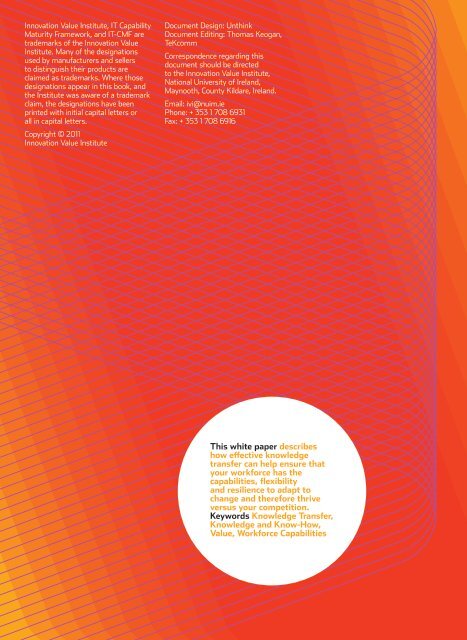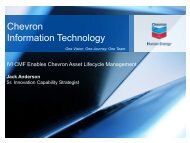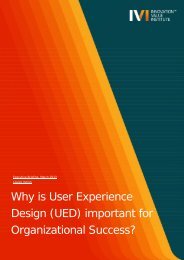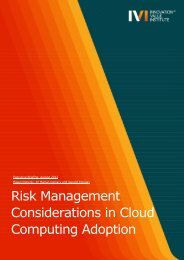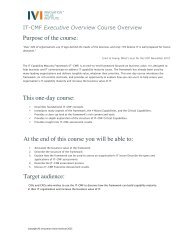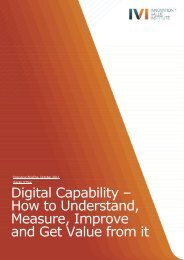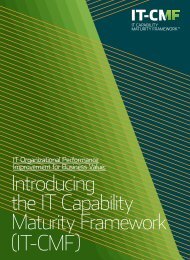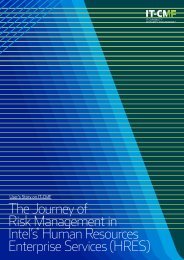IVI - Innovation Value Institute - National University of Ireland ...
IVI - Innovation Value Institute - National University of Ireland ...
IVI - Innovation Value Institute - National University of Ireland ...
Create successful ePaper yourself
Turn your PDF publications into a flip-book with our unique Google optimized e-Paper software.
<strong>Innovation</strong> <strong>Value</strong> <strong>Institute</strong>, IT Capability<br />
Maturity Framework, and IT-CMF are<br />
trademarks <strong>of</strong> the <strong>Innovation</strong> <strong>Value</strong><br />
<strong>Institute</strong>. Many <strong>of</strong> the designations<br />
used by manufacturers and sellers<br />
to distinguish their products are<br />
claimed as trademarks. Where those<br />
designations appear in this book, and<br />
the <strong>Institute</strong> was aware <strong>of</strong> a trademark<br />
claim, the designations have been<br />
printed with initial capital letters or<br />
all in capital letters.<br />
Copyright © 2011<br />
<strong>Innovation</strong> <strong>Value</strong> <strong>Institute</strong><br />
Document Design: Unthink<br />
Document Editing: Thomas Keogan,<br />
TeKcomm<br />
Correspondence regarding this<br />
document should be directed<br />
to the <strong>Innovation</strong> <strong>Value</strong> <strong>Institute</strong>,<br />
<strong>National</strong> <strong>University</strong> <strong>of</strong> <strong>Ireland</strong>,<br />
Maynooth, County Kildare, <strong>Ireland</strong>.<br />
Email: ivi@nuim.ie<br />
Phone: + 353 1 708 6931<br />
Fax: + 353 1 708 6916<br />
This white paper describes<br />
how effective knowledge<br />
transfer can help ensure that<br />
your workforce has the<br />
capabilities, flexibility<br />
and resilience to adapt to<br />
change and therefore thrive<br />
versus your competition.<br />
Keywords Knowledge Transfer,<br />
Knowledge and Know-How,<br />
<strong>Value</strong>, Workforce Capabilities<br />
01<br />
Introduction<br />
The aging workforce, with looming boomer retirements<br />
and anticipated dire consequences as important<br />
knowledge walks out the door, has been a topic <strong>of</strong><br />
discussion, <strong>of</strong>ten with only minimal planning. The exodus<br />
is inevitable, but unfavourable economic conditions and<br />
poor personal financial planning have caused boomers<br />
to delay their departure. You might be breathing a<br />
sigh <strong>of</strong> relief that your company has been granted a<br />
window <strong>of</strong> opportunity to mitigate against knowledge<br />
loss risks and deal with more pressing issues. Are<br />
you using these next few years to get prepared?<br />
At the same time, there is a growing concern<br />
about a skills gap in many <strong>of</strong> the new hires<br />
joining your company. According to the American<br />
Society for Training and Development (ASTD) [1],<br />
a critical skills gap exists when a company has<br />
difficulty growing and remaining competitive due<br />
to its inability to fill critical jobs with employees<br />
who have the necessary skills and knowledge to<br />
perform capably. There two underlying causes:<br />
changing jobs (which is always occurring) and<br />
lagging education in the school systems. Your<br />
company cannot wait for government- and<br />
business-sponsored initiatives to address<br />
education reform. You may have to develop your<br />
own training programs to close the skills gaps.<br />
Not only is your workforce being squeezed<br />
at both ends, there are plenty <strong>of</strong> other forces<br />
reshaping business in the 21st century. Examples<br />
include: globalisation, increased competition,<br />
growing emphasis on knowledge work, critical<br />
skills gaps in technical jobs, less training and<br />
experience, generational diversity, environment<br />
and safety concerns, virtual teams, outsourcing<br />
and contractors, information overload, and social<br />
networking. How will these forces impact your<br />
company’s strategic plans and business goals?<br />
Business Case<br />
As a business manager you face many challenges<br />
in meeting objectives: such as aligning team goals<br />
to strategic plans; delivering targeted business<br />
results; addressing safety, reliability and other<br />
compliance directives; and increasing workforce<br />
performance – all <strong>of</strong> which must be done within<br />
tight budgets and timelines. The toughest<br />
challenge may be to ensure that your team has<br />
the training and know-how to deliver the highquality<br />
results necessary to achieve your business<br />
goals and metrics. And that is just your day job.<br />
Corporate restructuring, hiring, mergers and<br />
acquisitions, or plans to reduce costs by adding<br />
resources in low-cost geographies create additional<br />
needs to get new employees up to speed rapidly.<br />
Do not forget the boomers; once their investments<br />
recover, they will start retiring at a faster pace.<br />
You need to make sure their departure does not<br />
leave gaps in the critical knowledge and skills<br />
that you need to run and grow your business.<br />
These scenarios have at least one thing in<br />
common: a requirement for cost-effective ways<br />
to transfer knowledge from those who have it<br />
to those who need it. This need has never been<br />
greater. Are you getting practical and effective<br />
guidance on what to do from your company’s<br />
HR or Knowledge Management (KM) groups?<br />
Knowledge is a necessary ingredient for high<br />
workforce performance, but it is not enough. You<br />
also need seasoning in the form <strong>of</strong> experience<br />
that applies the knowledge in real work. The<br />
combination <strong>of</strong> knowledge with the ability to<br />
apply it effectively is called know-how, and it<br />
typically takes many years <strong>of</strong> practice to develop.<br />
The difference in effectiveness <strong>of</strong> knowledge<br />
and know-how can be illustrated by comparing<br />
a medical intern to a surgeon with ten or more<br />
years <strong>of</strong> practice. If you need an operation, you<br />
are more likely to choose the know-how <strong>of</strong> the<br />
surgeon over the intern’s up to-date knowledge<br />
from the latest medical journals. When an<br />
employee already has significant know-how,<br />
new knowledge can be quickly learned and put<br />
into action. Novices lacking this experience will<br />
be unable to apply new knowledge as quickly.


